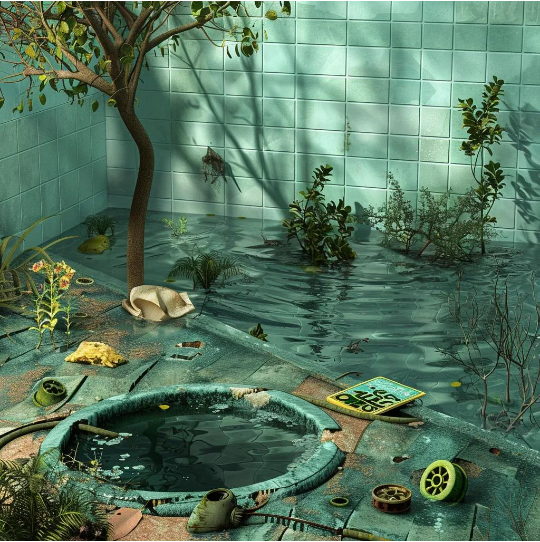
Harmful Effects Of Blocked Drainage
Blocked drainage creates a domino effect of health threats, structural damage, and escalating costs that every homeowner should recognise. From contaminated water breeding pathogens to mold undermining indoor air quality, a single clog can cascade into widespread harm. Mitchel Plumbing and Gas combines expert diagnosis, advanced cleaning methods, and preventative maintenance to stop these dangers at their source. This guide examines:
- Key health hazards and disease vectors
- Structural and water damage mechanisms
- Financial and environmental fallout
- Early warning indicators homeowners must spot
- The key role of professional drain services
- Everyday prevention strategies
With actionable insights and seamless integration of Mitchel Plumbing and Gas’s solutions, you’ll gain the authority to protect your home, your family’s well-being, and your wallet from the hidden perils of blocked drainage.
What Are the Major Health Hazards Caused by Blocked Drainage?
Blocked drainage poses immediate health hazards by creating stagnant water pockets that harbor pathogens, mold spores, and airborne toxins. This contamination pathway leads to water-borne outbreaks, respiratory distress, pest-borne infections, and indoor air quality deterioration. Addressing these hazards early prevents chronic conditions and acute illnesses.
How Do Bacteria and Viruses from Stagnant Water Cause Water-Borne Diseases?
Stagnant water trapped by a blockage becomes a breeding ground for bacteria and viruses that cause diseases such as E. coli infection, Salmonella, Hepatitis A, and Legionnaires’ disease.
- Bacteria multiply in nutrient-rich sewage backups.
- Contaminated splash or aerosol carries pathogens onto surfaces.
- Ingested or inhaled pathogens invade gastrointestinal or respiratory systems.
These water-borne diseases can lead to severe dehydration, fever, and long-term organ damage. Recognising early contamination helps Mitchel Plumbing and Gas intervene with targeted drain disinfection and pipe sanitisation to halt outbreaks.
Waterborne Diseases from Stagnant Water
Stagnant water in blocked drains can become a breeding ground for bacteria and viruses, leading to waterborne diseases. These pathogens can cause severe health issues, including gastrointestinal problems and, in some cases, long-term organ damage. Early intervention, such as drain disinfection, is important to prevent outbreaks.
What Respiratory Problems Are Triggered by Mold and Mildew Growth?
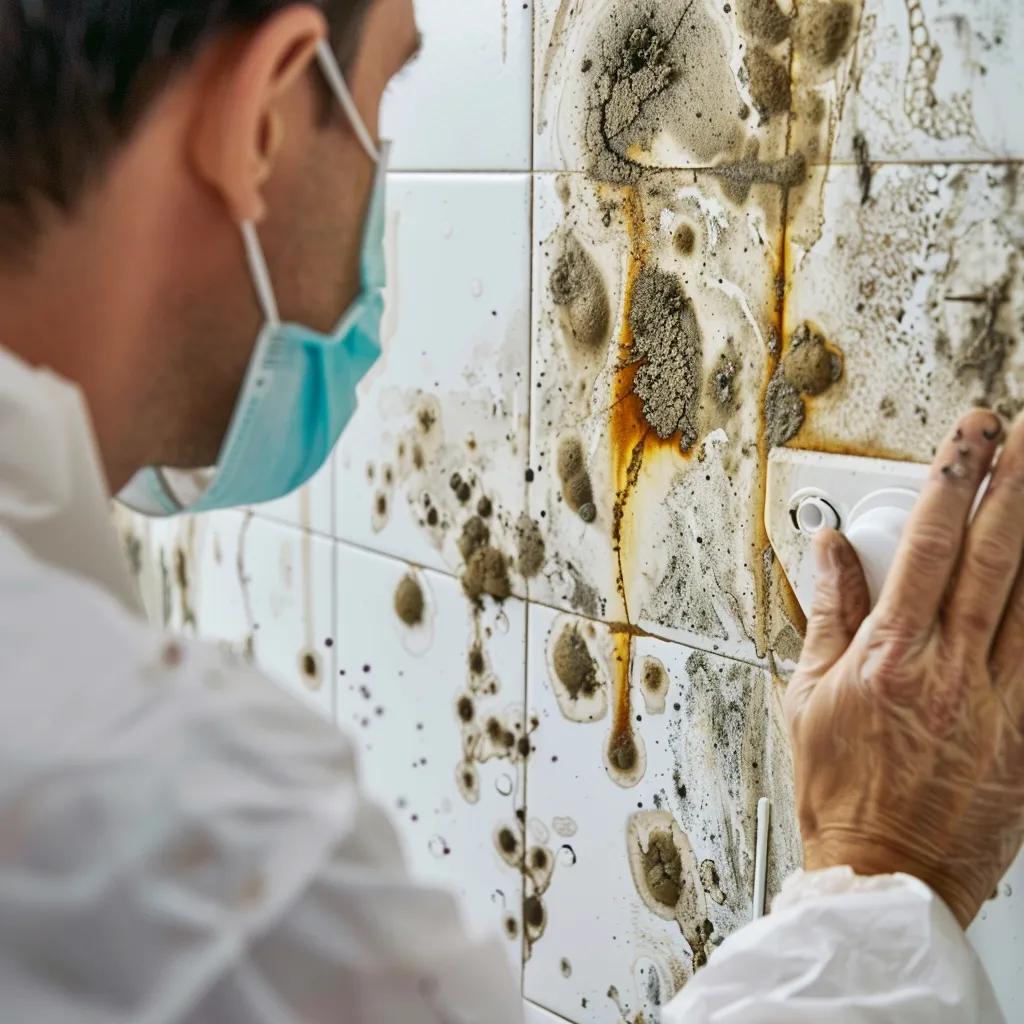
Moisture from unresolved blockages cultivates mold and mildew on walls, ceilings, and hidden cavities. Mold releases spores and mycotoxins that:
- Trigger allergic rhinitis and sinusitis
- Exacerbate asthma and bronchitis symptoms
- Cause persistent coughing, wheezing, and chest tightness
Addressing mold at its source requires both drain clearing and moisture control. Mitchel Plumbing and Gas’s comprehensive inspection includes moisture mapping to prevent respiratory complications before they escalate.
Mold and Respiratory Problems
Moisture from blocked drains fosters mold growth, releasing spores and mycotoxins that can trigger respiratory issues. Exposure to mold can lead to allergic reactions, exacerbate asthma, and cause other respiratory complications. Addressing the source of moisture is essential to prevent these health problems.
Which Pests Are Attracted by Blocked Drains and What Diseases Do They Spread?
Blocked drains lure insects and rodents seeking water and organic matter. Common invaders include cockroaches, rats, mice, and drain flies, each carrying distinct pathogens:
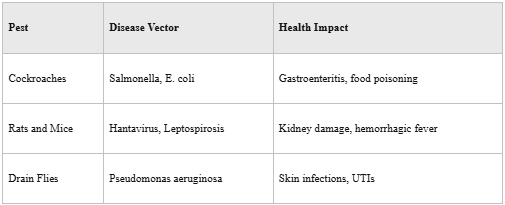
Pest-related illnesses compound the risks of water-borne diseases. Eliminating blockages and breeding grounds cuts off their lifeline. Mitchel Plumbing and Gas integrates drain cleaning with habitat removal to break the pest-disease cycle.
How Do Foul Odors and Toxic Gases from Blocked Drains Affect Indoor Air Quality?
Organic matter decomposition in clogged pipes produces foul odors and gases like hydrogen sulfide and methane. Inhaling these toxins can cause:
- Headaches, dizziness, nausea
- Eye and throat irritation
- Long-term neurological effects at high concentrations
Neutralising noxious emissions requires full removal of debris and proper ventilation. Mitchel Plumbing and Gas employs hydro jetting and odor-neutralising agents to restore safe, breathable air throughout your home.
How Does Blocked Drainage Lead to Severe Property Damage?
When drainage backflow inundates living spaces, even minor blockages can escalate into extensive water damage, compromised foundations, pipe failures, and electrical hazards. Understanding these mechanisms is vital for timely professional intervention.
In What Ways Can Blocked Drains Cause Flooding and Water Damage?
A blocked main drain prevents wastewater from exiting, forcing it back through lower-level fixtures and floor drains. This overflow:
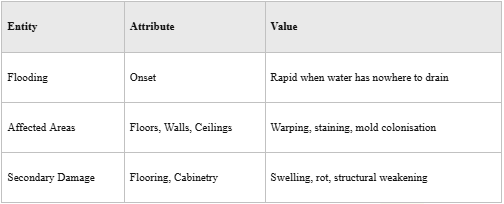
Unaddressed flooding can ruin carpets, sheetrock, and personal belongings. Mitchel Plumbing and Gas’s emergency response team rapidly clears blockages and pumps out water to minimise structural damage and restore dry conditions.
How Does Water Seepage from Blockages Weaken Foundations and Walls?
Chronic seepage from slow blockages saturates soil around foundations, leading to hydrostatic pressure that:
- Forces water through cracks into basements
- Causes masonry to spall and mortar joints to fail
- Leads to foundation settling and visible wall fissures
Timely drain line repairs and installation of backwater valves by Mitchel Plumbing and Gas relieve pressure, preserving foundational integrity and preventing costly underpinning work.
Why Do Blocked Drains Increase the Risk of Burst Pipes and Leaks?
Pressure build-up behind a clog stresses pipe walls, seals, and joints. Over time, this leads to:
- Micro-fissures that expand into leaks
- Sudden bursts under peak usage or thermal stress
- Hidden water loss that undermines wall cavities and flooring
Mitchel Plumbing and Gas uses video camera inspections to pinpoint weak points, then offers targeted pipe relining or replacement to eliminate leak risks before catastrophic failure.
What Electrical Hazards Can Result from Drainage-Related Water Exposure?
Water intrusion from blocked drains can reach electrical outlets, switches, and wiring conduits, creating hazards such as:
- Short circuits and tripped breakers
- Corroded connections leading to arcing and sparks
- Potential fire ignition sources in concealed spaces
Mitchel Plumbing and Gas coordinates with licensed electricians to assess and remediate water-exposed circuits, ensuring both plumbing and electrical systems remain safe and code-compliant.
What Are the Financial and Environmental Consequences of Neglecting Blocked Drains?
Avoiding routine drain maintenance can balloon repair expenses, depress property valuations, trigger insurance disputes, and spill contamination into ecosystems. A proactive approach by Mitchel Plumbing and Gas keeps both budgets and environments healthy.
How Do Repair and Restoration Costs Escalate Due to Drain Neglect?

The longer a clog persists, the more extensive the damage and the higher the bills. Typical cost progression:
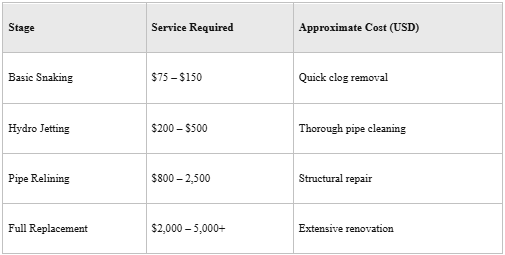
Early intervention by Mitchel Plumbing and Gas often reduces expenses by up to 60% compared to emergency restoration following extensive water or mold damage.
Financial Impact of Blocked Drains
Neglecting blocked drains can lead to escalating repair costs and potential property value depreciation. The longer a blockage persists, the more extensive the damage, resulting in higher expenses for repairs and restoration. Regular maintenance and prompt intervention can help mitigate these financial risks.
How Does Blocked Drainage Impact Property Value and Insurance Claims?
Visible water stains, mold reports, and unresolved plumbing issues lower resale appraisal values by an average of 10–15%. Insurance carriers may deny claims if maintenance records are lacking. Mitchel Plumbing and Gas provides documented service reports and preventative plans to support both market value and insurance compliance.
What Environmental Contamination Results from Sewage Overflow and Drainage Failures?
Untreated sewage release from overloaded lines introduces pathogens and nutrients into soil and waterways, causing:
- Algal blooms that deplete oxygen in aquatic habitats
- Toxic microorganisms that endanger wildlife and human health
- Groundwater contamination affecting drinking supplies
Mitchel Plumbing and Gas advises on backwater prevention valve installation and routine inspections to protect your property and surrounding ecosystem from sewage-related pollution.
What Are the Early Warning Signs of Blocked Drainage Every Homeowner Should Know?
Recognising the first indications of restricted flow empowers homeowners to call Mitchel Plumbing and Gas before minor clogs become major crises.
Which Common Indicators Signal Slow Drainage and Water Backup?
Persistent delays in sink, shower, or floor drain emptying, even minimal pooling indicate blockages forming within pipes. Early signs include:
- Water receding slowly after use
- Visible residue or debris at drain inlets
- Frequent manual plunger usage
Prompt attention prevents overflow events and curbside backups.
How Can Unusual Noises and Foul Smells Reveal Drain Blockages?
Gurgling sounds when a fixture is in use signal trapped air pockets fighting to escape blocked areas. Likewise, strong, sour or rotten-egg odors suggest organic buildup decomposing inside lines.
Detecting these warning cues triggers immediate drain inspection and hygienic cleaning.
What Visible Signs Suggest Mold Growth and Pest Infestation from Blocked Drains?
Stains, dark spots, or fuzzy growth near drain junctions indicate moisture-driven mold. Sightings of drain flies swarming around fixtures or rodent droppings near floor drains reveal pest entry points. Mitchel Plumbing and Gas’s full suite of services tackles blockages and moisture control to eliminate these downstream hazards.
Why Is Professional Drain Cleaning Essential to Prevent Harmful Effects of Blocked Drainage?
DIY plungers and bottle treatments offer only temporary relief, leaving pathogens, root intrusion, and corrosion intact. Professional intervention by Mitchel Plumbing and Gas ensures comprehensive diagnostics and long-term protection against health, property, and financial risks.
How Does Mitchel Plumbing and Gas Diagnose and Resolve Complex Drainage Issues?
Mitchel Plumbing and Gas employs high‐definition camera inspections and electronic leak detection to map clogs, roots, and pipe damage. Based on findings, technicians apply tailored solutions such as hydro jetting, mechanical snaking, or trenchless pipe relining to restore full flow without invasive excavation.
What Advanced Services Prevent Long-Term Property Damage and Health Risks?
Advanced offerings include:
- Hydro Jetting to scour scale, grease, and biofilm
- Pipe Relining to seal cracks and prevent root intrusion
- Odor Control Treatments to neutralise volatile compounds
- Moisture Barrier Installation around foundations
These measures safeguard structural integrity, indoor air quality, and overall hygiene for lasting peace of mind.
How Can Regular Preventative Maintenance Protect Your Home and Finances?
Scheduled drain inspections and cleanings identify early blockages, corrosion, and minor leaks, typically covered by maintenance plans for predictable budgeting. Preventative maintenance reduces emergency call‐outs, curbs repair costs, and preserves property value over time.
What Emergency Plumbing Solutions Address Urgent Drain Blockages?
When severe backups occur, Mitchel Plumbing and Gas offers 24/7 emergency response, including rapid‐deployment jet trucks, portable pumping, and on‐site diagnostics. Fast action mitigates water damage, limits mold growth, and restores safe living conditions within hours rather than days.
What Practical Tips Can Homeowners Follow to Prevent Blocked Drainage and Its Harmful Effects?
Daily habits and smart usage protect your plumbing network from debris, grease, and root encroachment complementing Mitchel Plumbing and Gas’s professional services with hands-on vigilance.
Which Daily Habits Reduce the Risk of Drain Clogs and Pest Infestations?
Implement these simple routines:
- Use Sink Strainers to catch hair and food particles.
- Flush with Hot Water weekly to dissolve grease buildup.
- Avoid Pouring Oil Down Drains; collect in sealed containers.
- Maintain Gutter Drainage to prevent root invasion.
How Can Proper Waste Disposal and Drain Usage Protect Your Plumbing System?
Dispose of coffee grounds, egg shells, and fibrous scraps in compost or trash, not garbage disposals. Run cold water while the disposal is active to push debris through pipes. Limit harsh chemical cleaners that erode pipe linings; instead, choose enzyme-based treatments when needed.
When Should You Schedule Professional Drain Inspections and Cleaning?
Arrange professional drainage checks at least once a year, or more frequently if you live in a mature landscape area prone to root intrusion. After heavy rains or following any unusual odors or backups, contact Mitchel Plumbing and Gas to perform targeted inspections and clear emerging blockages before they escalate.
Blocked drains threaten health, home, and finances but they need not define your living environment. Timely recognition of warning signs, disciplined prevention habits, and strategic collaboration with Mitchel Plumbing and Gas ensure that blockages never spiral into crises. By combining daily vigilance with expert drain cleaning, you’ll safeguard air quality, structural integrity, and your budget for years to come.
For tailored solutions and emergency service, reach out to Mitchel Plumbing and Gas today and restore confidence in your drainage system.
Recent Post

How Running Toilets Skyrocket Your Water Bill
Running toilets waste significant water daily—minor leaks (1-2 gallons), moderate leaks (3-6 gallons), and major leaks (7+ gallons)—directly increasing water bills. Households fixing these issues report 15-45% savings on monthly bills, with regular maintenance of flappers and valves preventing costly problems.

9 Different Types of Solar Hot Water Systems
A comprehensive guide to the 9 different types of solar hot water systems available in Brisbane. From budget-friendly flat plate collectors to premium evacuated tube systems, learn about the pros, cons, efficiency ratings, and costs of each option. Most solar hot water systems can provide between 50-100% of your home's hot water needs, with installation costs ranging from $2,000 for basic systems to $9,000 for premium configurations. Find out which system is best suited for your household size, climate conditions, and budget to maximize energy savings while ensuring reliable hot water supply year-round.

Gas vs Electric Hot Water Systems
At Mitchell Plumbing & Gas, we know that both gas and electric hot water systems offer different benefits for Brisbane homes. Gas hot water systems use natural gas or LPG to heat water, while electric hot water systems rely on electric heating elements. These hot water systems differ in several ways:






.svg)